|
Have a safe day!
Tuesday, Oct. 14
3:30 p.m.
Director's Coffee Break - 2nd Flr X-Over
THERE WILL BE NO ACCELERATOR PHYSICS AND TECHNOLOGY SEMINAR THIS WEEK
Wednesday, Oct. 15
3:30 p.m.
Director's Coffee Break - WH2XO
4 p.m.
Fermilab Colloquium - One West
Speaker: Michael Lubell, American Physical Society, City College of New York
Title: From the Physics Trenches to the Political Swamp
Visit the labwide calendar to view Fermilab events
|
|
Tuesday, Oct. 14
- Breakfast: All-American breakfast
- Breakfast: bacon, egg and cheese bagel
- Ranch chicken breast sandwich
- Baked Cajun catfish
- Thai pork with peanut sauce
- California turkey panino
- Shrimp and crab scampi
- Chef's choice soup
- Minnesota chicken and rice soup
- Assorted pizza by the slice
Wilson Hall Cafe menu
|
|
Wednesday, Oct. 15
Lunch
- Orange glazed pork tenderloin
- Cranberry tabbouleh
- Snap pea sauté
- Apple crisp
Friday, Oct. 17
Dinner
Closed
Chez Leon menu
Call x3524 to make your reservation.
|
|
Fermilab team one of three finalists in Chicago Innovation Exchange challenge
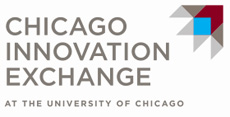 |
| A Fermilab computing team is one of three finalists in the Chicago Innovation Exchange challenge. |
Three teams led by innovators at Argonne National Laboratory, University of Chicago's Computation Institute, Fermilab and the University of Illinois at Urbana-Champaign have been named finalists in the CIE + Cisco EIR Innovation Challenge. The challenge was created this year by the Chicago Innovation Exchange and Cisco Entrepreneurs in Residence to support early-stage startups building game-changing products in the Internet of Everything, big data, cloud computing and other transformational areas. The three finalists — Parallel Works, CEMAS and Embedor — are competing for an opportunity to become a part of the CiscoEIR@CIE, a joint incubation program that will launch later this fall.
Parallel Works has developed technology that enables complex and compute-intensive modeling, simulation and analytic workflows to be performed rapidly, easily and economically on parallel computing systems. Led by Michael Wilde, a software architect at Argonne and senior fellow at the Computation Institute, Parallel Works' technology can help scientists, engineers and data analysts to perform the computations that increase their quality and speed their products to market, with greater ease, lower cost and far less distraction from their core business mission than was previously possible.
Cloud-based Event Monitoring and Storage technology supports emergent Internet-aware devices from the Internet of Everything, providing a central hub for storage and event monitoring of data generated by objects and sensors. Led by Fermilab's deputy CIO, Jin Chang, the team is working to develop partnerships that would support proof-of-concept testing and commercialization of the service.
Embedor's technology enables continuous real-time structural health monitoring of civil infrastructure using wireless smart sensors, enabling infrastructure owners to improve the reliability of inspections and significantly reduce maintenance costs. Kirill Mechitov, a postdoc in the Department of Computer Science at the University of Illinois at Urbana-Champaign, leads the team, which is looking to reduce catastrophic bridge failures by improving the way structural and civil engineers assess and analyze the health of bridges.
Read more
—Nikki Kidd
|
Bruce Riley, Renee Robbins talk 'Negentropy' - tomorrow at noon in Fermilab Art Gallery
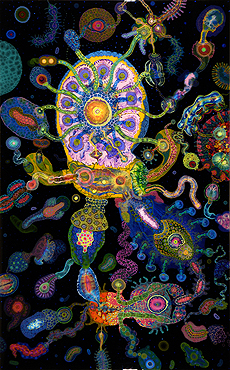 |
| An art talk on the current Fermilab Art Gallery exhibit takes place tomorrow at noon. This painting by Bruce Riley, "Lilith with Lilin, Baby Momma," is part of the exhibit.
|
On Wednesday, Oct. 15, at noon, artists Bruce Riley and Renee Robbins will discuss their work in the exhibit "Negentropy," currently at the Fermilab Art Gallery.
Both artists share an interest in vivid color, obsessive detail, nature and science. Their work blurs the microscopic and macroscopic, moving between worlds that are imagined and real. Robbins' paintings create a window into a rich universe of indiscernible scale with patterns of systemic flow and visual poetry. Riley's paintings are lush objects that present enigmatic narratives. Negentropy touches on the overarching theme for this collection of artworks and pulls from the rich intersection of science, nature and art.
|
How open source technology is being deployed in science
From ZDNet, Oct. 9, 2014
Given the transparent and collaborative nature of open source, it is no wonder that the technology is widely used all around the world. Countless organizations and industries have benefited immensely from open source software — with science and engineering among the sectors driving the charge.
In an industry that heavily relies on technology and innovation, the deployment of open source initiatives in the scientific field should come as no surprise. In fact, CERN, one of the most revered names in the world of science, extensively uses open source software — here's why.
Read more
|
Two new strange and charming particles appear at LHC
From New Scientist, Oct. 8, 2014
Two new particles have been discovered by the LHCb experiment at CERN's Large Hadron Collider near Geneva, Switzerland. One of them has a combination of properties that has never been observed before.
The particles, named DS3*(2860)- and DS1*(2860)-, are about three times as massive as protons.
Physicists analysed LHCb observations of an energy peak that had been spotted in 2006 by the BaBar experiment at Stanford University in California, but whose cause was still unknown.
Read more
|
|
Celebrating NOvA
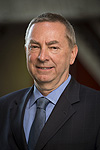 |
Fermilab Director
Nigel Lockyer
|
Last week we joined the NOvA collaboration in celebrating the culmination of nearly a decade of hard work. Five years after shovels were first put into the ground and two years after construction began in earnest on the far detector in Minnesota, both the near and far detectors of NOvA are complete. And with CD-4 approval from the Department of Energy in place, the experiment has truly begun.
Many thanks go to everyone who was involved along the way. As detailed by Project Manager John Cooper and Associate Project Manager Paul Derwent from Fermilab, as well as NOvA co-spokesperson Mark Messier of Indiana University, during last Wednesday's all-hands presentations, a project the size of NOvA requires hundreds of people working in concert to successfully pull it off.
The NOvA collaboration includes 208 scientists from 38 institutions in seven countries, but that's just the tip of the iceberg. Here are some statistics that will give you an idea of the scope of this project and how many people were involved:
- More than 365,000 plastic modules, assembled by hundreds of undergraduate students at the University of Minnesota
- 2.7 million gallons of liquid scintillator to be blended and precisely poured into the detectors
- More than 1,200 truckloads of PVC plastic tubes shipped between Texas, Wisconsin and Minnesota
- 105 railcars of mineral oil that led to 414 tanker loads of scintillator
- More than 400 Fermilab employees who worked on the NOvA accelerator and NuMI upgrades, converting the Recycler from an antiproton accumulator to a proton accumulator
- Another 250 Fermilab employees who worked on project management and the NOvA detectors, including the near detector built at Fermilab and installed in a new underground cavern
- The full-time equivalent of 880 years of work from people at Fermilab, Argonne, the University of Minnesota and outside contractors working on NOvA detectors
The beautiful neutrino event pictures, which can be seen online, demonstrate the exquisite high resolution of the absolutely huge 14,000-ton far detector. The team should be proud of the performance of the detector they have built.
The worldwide particle physics community is eagerly awaiting the first science results. Let's hope NOvA will dramatically change our view of the universe.
|
New cryogenics system installed in MC-1 Building
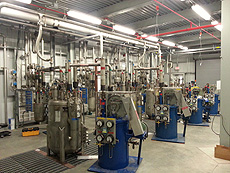 |
The new cryogenic system for the Muon g-2 experiment will help cool the 50-foot-diameter muon storage ring. Photo: Bill Soyars, AD |
The Accelerator Division Cryogenics Department successfully operated the Muon g-2 cryogenic system for initial commissioning during a two-week period from Sept. 25 to Oct. 9. They tested key components of the refrigeration system, newly installed in the MC-1 Building. The components included inventory storage, cryogenic piping, valves, compressors, expansion engines, heat exchangers, instrumentation and controls.
On Oct. 2, cryogenic operators produced liquid helium at the MC-1 Building for the first time, verifying proper function. This accomplishment was achieved by dedicated work of AD Cryogenics technical staff, with key support provided by AD, FESS and PPD, as well as independent system reviewers.
—Bill Soyars, AD
|
S curve
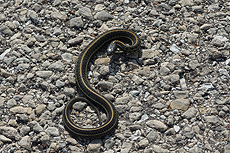 |
A small garter snake stops long enough on Main Ring Road at MI-40 to be captured on camera. Photo: Dan Munger, AD |
|
|